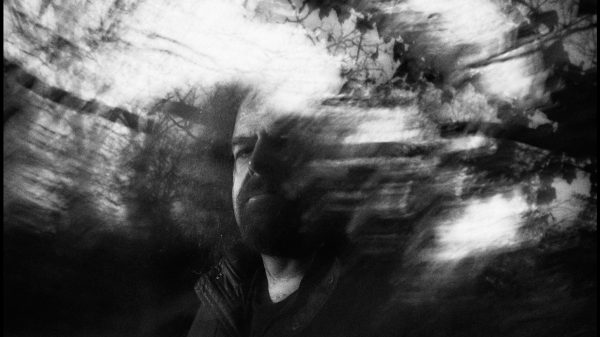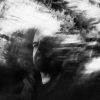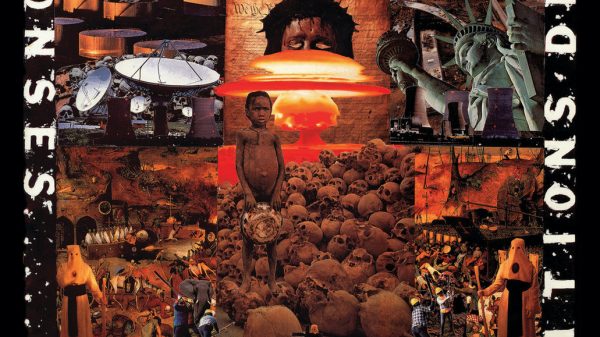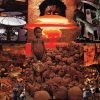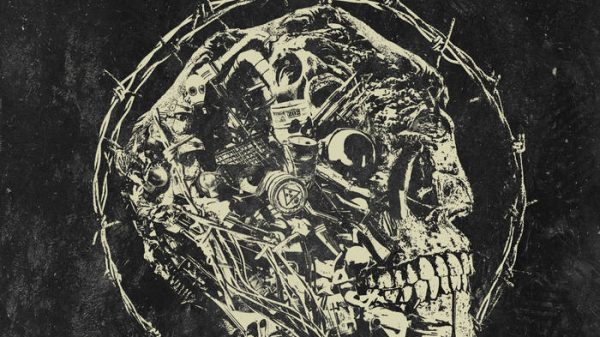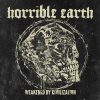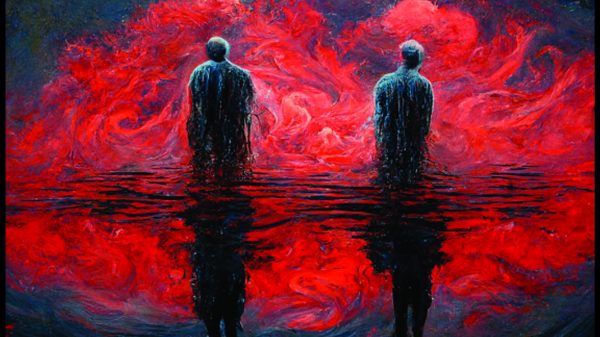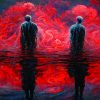Napalm Death, Brujería, Lock Up and Power Trip have just finished their “Campaign for Musical Destruction Tour” across Europe. I talked with SHANE EMBURY, one of grindcore’s founding fathers, the longest standing member of Napalm Death and also a member of Brujería and Lock Up, about the tour, career and new projects.
Marika Z.: The Campaign for Musical Destruction Tour is almost over and you have been travelling around Europe for almost a month. How’s it going?
Shane Embury: It’s been very good. I think a few of the shows have sold out, which is always a good thing. For me it’s been very busy because I’ve been playing in three of the bands on this tour, so no just one. I did Lock Up, Brujería and Napalm Death, which wasn’t always the intention. It kind of happened that way. The response has been good because, you know, seeing me three times a night… maybe people get bored, I don’t know.
No, no that’s impossible!
So it’s been pretty good. The reception has been good. We’ve known each other for a long time. The Power Trip guys are younger to the scene, but we played with them in America last year. So yeah, pretty cool.
Where does the strength to start such a demanding tour come from? Did you ever think about turning it down?
With this tour there were many different ideas with different bands. This will probably happen again next year because Brujería’s rhythm section is now me, Nicholas Barker and Anton Reisenegger, and that’s many of us from Lock Up. Since Lock Up’s new album just came out, I thought well, let’s bring Kevin in. I had a clear moment of insanity, and I said well, I’ll just do it. Bonnie was like, “Are you sure?” And, I said, well, let’s try. So that was kind of the idea behind it, to see if we could pull it off, I guess. We’re all very passionate about what we do, so we just tried to go for it the best we can.
As you said, you play with Brujería, Lock Up and Napalm Death for almost three hours. I have to tell you, you are such a rock!
My wife thinks I’m insane, so there you go…
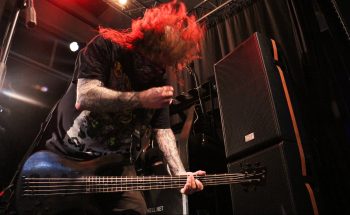
Did you prepare mentally or physically?
Not really, no. Mentally, it’s a weird thing. When you’ve been doing what we do for so long, you kind of snap into a particular mode. Usually when I go home after a tour it takes me about a week to slip back into reality, as I call it, because you spend so much time on the road. This is my 30th year in Napalm Death, so when you do it for so many years, it’s a programming almost. When I’m at home, sometimes during the day I’m useless, and then at night I just click on. It just happens really, and that’s kind of your mental preparation for it. Even like today, I’m feeling a little sick but I’m pretty sure that by the time Lock Up starts the adrenaline starts running, and it just becomes a course.
I have a question for you that I’ve asked myself for years: how do you manage to remember all the songs that you play. You play in three bands – that’s unbelievable!
Well, you can’t remember everything. You look at the songs that you’re going to play, the sets, and you rehearse them. With Napalm Death there are so many songs and we change the set often, so you may have to relearn certain parts, but a lot of it comes back. Sometimes you play a little bit better because you look up the older records and think, there are too many notes in that riff, maybe we can change that a little bit, because you were maybe more adventurous when you were younger than you should have been. So it kind of comes back.
Brujería, Lock Up and Napalm Death are similar in many aspects, but different in others. What’s different about playing with Napalm Death, Lock Up or Brujería on stage?
The drumming styles between Nicholas and Danny are a little different. Nicholas is very much into that radical metronome blasting, because that’s just the way he is, whereas Danny is more influenced by the older Napalm Death drummer who’s more free-flowing. So it’s similar to the older punk vibe, and he kind of breaks it down differently timing wise. Musically, Lock Up is possibly a little bit more streamed towards the old-school death metal, grindcore, and Napalm Death is lately more of a mixture of grindcore, punk, industrial and experimental. Brujería has always been, especially in the older albums written by Dino, very simplistic and kind of groove orientated. I like playing in every band for different reasons. Brujería is a lot of fun. Napalm Death is a more socially aware, political band. The other two bands are a little bit more abstract and strange and sometimes funny, which reflects my personality a little bit differently, because I’m not just into the political thing, I like to veer off into silliness as well.

You and the other guys are sharing this experience together. How was it spending so much time with the same people.
Well, we just always have. Some of these people, like Kevin Sharp – before he joined Lock Up he was also in another band called Venomous Concept I have with him. I met Kevin in 1989 when Napalm Death played in CBGB. During my first experience with Kevin, he was a journalist, he bought me my first slice of New York pizza and we’ve been friends ever since. Nicholas Barker, Anton Reisenegger, Bonnie – I’ve known these people for years, so they’re kind of like brothers to me. We all talk about simple life things during the day. I think people would be quite surprised at the conversations we have during the day, they’re quite boring. Life is life. So it’s not a problem really.
Can you remember a hilarious or a particular event that happened during this tour?
We all have our moments. One of the funniest guys is the sound engineer, Simon Efemy. He’s a long-time friend of mine. We have a heavy metal band called Absolute Power together, which is real tongue-in-cheek heavy metal. No one seems to really get it except us. But Sam is really funny because he’s from the West Midlands, he works with an indie band called The Wonder Stuff, he produced Paradise Lost, Amorphis. He’s got a crazy English humour. A very crazy English humor, and smelly gas. That’s all I’m going to say. He’s a funny guy, and you can smell Sam before you see him coming. That’s all I’m going to say. Which is not the best thing to say.
Let’s talk about your career. You started playing with Napalm Death in 1987. Then you played drum and guitar with Drop Dead, bass with Intestinal Infestation and guitar with Brujería and many more. We could say you’ve been playing for almost 30 years.
Well ,my first band was called Warhammer, in 1984.
What pushes you to keep going?
I always wanted to do it.
Have you ever thought about quitting?
No, I couldn’t think of doing anything else. It sounds very cheesy, but when I was five or six years old, on TV there was Slade, The Sweet, Marc Bolan and I loved that, seeing the drums and the guitars. There was a program called Top of the Pops in England and the theme tune in the 70’s was the Led Zeppelin “Whole Lot of Love”, so I loved that. And I just always said I wanted to be in a band. I formed my first band, then met the Napalm Death guys in 1986 – they blew my mind. I went on tour with them as a kind of roadie or whatever. I became good friends with the drummer and I got lucky enough to join them. So it is cliché, but it’s what I’ve always wanted to do and I’ve been lucky enough to do it. And once you get in there, after a few years you think: I’m good at this, and I’m not good at anything else, so I better try to work hard. I’ve met people along the way like Buzz Osborne from The Melvins, who is kind of my mentor. I like his work ethic. It just kind of drives you on.
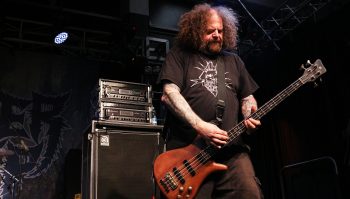
The first Campaign for Musical Destruction Tour was in 1992, right?
Yes
What’s different about playing these days compared to at the beginning of your career?
I think that 1992 was not the first tour, but it was a bigger tour in the sense that there were more promotional companies, booking agencies, bigger venues. We played in Czechoslovakia back then and there were around 8,000 or 9,000 people. So some shows were huge. The scene was not just starting, but you could tell it was not as crazy populated as it is now. So in some respects you were playing these big shows for the first time and you amazed the people that were turning up. And you were younger, so you were partying more, and things like that. But you look at it differently now because you’re older and you’ve done the experience more and more and more.
Maybe the view is different..?
Well, you’re playing in Czechoslovakia for 9,000 people. Now, in another location you might play to 1,000. It’s different, so your memories are different and in some respects, and in some places you’ve never been before, like Croatia or Macedonia. So you were thrilled at the fact of going to a place where you never thought you would go. Back then you were meeting people for the first time that you’re still friends with now, and seeing young bands play with you that are now huge is a really cool experience, really. And it’s through younger eyes, I guess. It was good times.
Same audience, right?
Yeah, I mean a lot of people have stayed around forever and they’ve become record labels and things like that. So you’ve seen all that. But the scene was definitely starting to evolve.
What band have you been listening to during this tour or in general during this month? Is there some new band that you like?
I listen to many different kinds of music. All kinds of things. The two things I’m listening to at the moment is the new album by the artist called Goldfrapp. I really like Alison Goldfrapp, ever since the first album. The first album reminds me of the 60s/70s kind of stuff, which I love. She changes a lot. And I love the new Mastodon album. The new Mastodon album, Emperor of Sand is my favourite Mastodon record.
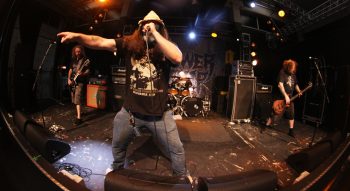
Lock Up just released a new album, “Demonization.” Brujería released “Pozo Aztlán” in September 2015. And the last album from Napalm Death is from 2015. Are you working on something new?
We’re going to record some new Napalm songs in August.
What sound are you looking for?
It’s going to probably continue from the last album. It will be fast songs, but again, more experimental songs I think. The title track from Apex Predator was an industrial thing where we recorded stuff that we were bashing and then we sequenced it together. So I’d like to do more stuff like that, more experimental noise and then mix that in with the standard grindcore thing that we do. And just try to take it further. Try and work on dynamics again: noisy and then quiet, things like that. Hopefully try to work towards that. And then Bonnie has a concept of the new album, which he’s kind of keeping quiet right now. We recorded some new Brujería songs a few months ago in Los Angeles. So things are happening. I’ve got other projects that I’m working on. So very busy.
Your dedication and contribution to extreme music is outstanding. Can you please give some advice to any young musician or any band that wants to play grindcore.
The one thing that I did and a few of my friends did when we first started was – obviously we were influenced by many different bands, but we didn’t always do lots of covers. Not because we didn’t want to, but because we wanted to do our own compositions. And I think that if you listen to Napalm Death or Nasum or Agoraphobic Nosebleed, what I noticed – and I don’t mean to be rude about this – in the third album of Morbid Angel, they have this guitar squeak, every band did the same guitar squeak, and to me that’s too copyist. Some of my favourite bands, like Death, Massacre or Obituary, were heavy, but they all sounded different. It’s hard to do that, and I think the way to do it is to take little pieces of the things that you like and you pull it together. You don’t completely 100% copy it. It keeps it more interesting. And don’t be afraid to do something challenging. Because if you like it, that’s important. Sometimes when you’re young you might be afraid and think, “Oh, I shouldn’t really do this because it maybe doesn’t fit in with the grindcore ethic.” But that’s the way you do something different, by being brave, really. That’s the way to move forward. And now there are so many different styles, so many different genres that it’s good to sort of break the rules. Some people ask me how I learned to play bass. But I kind of didn’t. I kind of worked my own thing out. And that’s the best way.
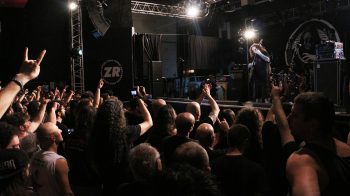
(Photos: Ilaria Sperandio)







